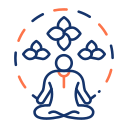Using Meditation to Improve Sleep and Mental Health
Chosen theme: Using Meditation to Improve Sleep and Mental Health. Welcome to a gentle, practical space where small daily practices create big, restorative change. Settle in, breathe, and let’s begin together.

The Brain’s Relaxation Response
Meditation triggers the parasympathetic nervous system, slowing heart rate and softening muscle tension. As arousal settles, the mind stops rehearsing worries, making room for sleep to arrive more naturally.

Stress, Cortisol, and the 3 a.m. Wake-Up
Chronic stress elevates cortisol, often peaking at inconvenient hours. A steady meditation routine lowers baseline stress, reduces nighttime spikes, and helps you glide back to sleep without spiraling into worry.
Starting Your Evening Practice
01
Five-Minute Wind-Down Ritual
Begin small. Sit comfortably, dim lights, silence notifications, and breathe slowly. Five focused minutes each evening create momentum, proving to your mind that calm is both accessible and learnable tonight.
02
Creating a Sleep-Supportive Space
Clear the nightstand, soften the lighting, and choose a supportive seat or pillow. Let your meditation corner feel welcoming yet simple, so your brain associates the space with comfort, safety, and rest.
03
Consistency Over Perfection
Miss a night? Start again tomorrow without judgment. Consistency rewires habits; perfection stalls progress. Share your schedule goals in the comments, and let the community cheer your calm, steady return.
Techniques that Support Sleep and Mood
Body Scan for Deep Release
Lie down, breathe into each body region, and imagine exhaling tension. The body scan turns vague unease into specific relaxation, gently inviting heaviness in the limbs and the sweet drift toward sleep.
Loving-Kindness to Soothe the Mind
Silently repeat phrases like, “May I be calm. May I rest.” Compassion reduces self-criticism and loneliness, easing anxious loops that keep us awake. Extend kindness outward, and notice your chest soften.
Breath Counting to Slow the Nervous System
Inhale for four, exhale for six, and count ten cycles. Longer exhales deepen relaxation, guiding the nervous system down a rung. If you lose count, smile, and begin again with gentle curiosity.
A Personal Story: From Insomnia to Inner Quiet
I used to wake at 2 a.m., scrolling headlines as dread tightened my chest. A therapist suggested five quiet minutes nightly. Skeptical yet desperate, I promised myself tiny steps and honest tracking.


A Personal Story: From Insomnia to Inner Quiet
Week two, I noticed fewer spirals. I paused at wake-ups, placed a palm on my belly, and counted breaths. Thoughts still visited, but their edges softened, and sleep returned more quickly.
Daytime Meditation for Mental Health
Take sixty seconds to close your eyes, unclench your jaw, and breathe into your back. These tiny resets lower cumulative stress so bedtime isn’t your first attempt at relaxing all day.
Daytime Meditation for Mental Health
When anxiety rises, whisper, “This is hard, and I can be kind to myself.” Compassion balances the nervous system, preventing spirals that steal sleep. Comment your favorite phrase to encourage another reader.





Share Your First Week
Post a quick note about what helped most, what felt hard, and one tiny change you’ll keep. Your reflections might be exactly what another reader needs to try tonight with hope.
Subscribe for Guided Sessions
Join our newsletter for gentle, sleep-focused meditations and practical mental health tips. Expect brief, soothing recordings you can use at bedtime, plus reminders that progress grows from consistent, compassionate practice.
Questions We Can Explore Together
What meditation length works best for you? How do you handle wakeful nights compassionately? Comment your questions, and let’s shape upcoming posts around your real experiences and obstacles to restful sleep.
